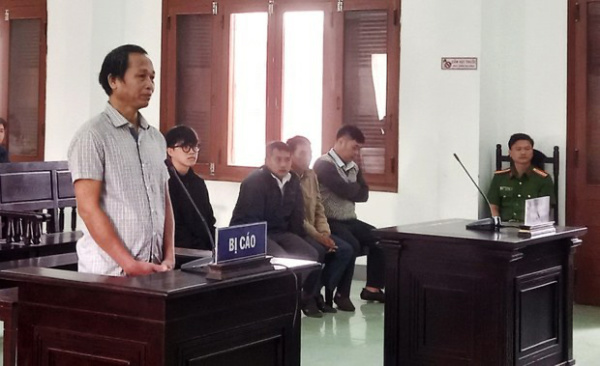
ELLIS HEASLEY, of UK-based religious freedom advocacy CSW, says international community must hold Vietnam to the highest standards of international human rights given its role on the council…
London, UK
On 1st April, almost 18 months after government officials first threatened to do so, local authorities in Tong Hung, Vietnam finally destroyed a hall belonging to the Khmer-Krom Theravada Buddhist community.
For the small rural community in southern Vietnam’s Vinh Long Province, the demolition marked not only the loss of a place of worship, but also of a building that served multiple purposes, including as an educational centre for local children to learn the Khmer-Krom language, and a place to host community events.

The People’s Court of Phu Yen province sentenced religious freedom activist Nay Y Blang to four years and six months in prison for the crime of “abusing democratic freedoms” during the trial on 26th January, 2024. PICTURE: Cong An Nhan Dan/Copyright © 1998-2023, RFA. Used with the permission of Radio Free Asia, 2025 M St NW, Suite 300, Washington DC 20036.
“Such charges offer the clearest example of the intentions of the Vietnamese Communist Party: to suppress dissenting minority voices and stifle the activities of religion and belief communities across the country in the pursuit of total control.”
The Khmer-Krom are a predominantly Buddhist ethnic group that live in a part of southwest Vietnam that was once part of Cambodia; communities like that in Tong Hung they have faced harassment and human rights violations at the hands of the Vietnamese authorities for decades, however the government’s crackdown on the group has accelerated significantly in recent months.
On 20th March this year, for example, two Khmer-Krom activists were charged with “abusing democratic freedoms” under Article 331 of the Vietnamese Criminal Code after they organised trainings on the rights of indigenous people under international law. To Hoang Chuong and Thach Cuong had been detained for over eight months without access to legal assistance and family visits prior to their trial, and they were sentenced to four and three-and-a-half years in prison respectively.
The use of charges under Article 331 is a common tactic of the Vietnamese Government, as its vague wording grants the authorities tacit permission to arrest and charge any dissenting voices they please.
This was made clear once again just days after the sentencing of Chuong and Cuong, when on 26th March authorities arrested and defrocked Abbot Thach Chanh Da Ra, the head monk at the Dai Tho Pagoda. Abbot Da Ra was accused of using his position of influence to “abuse the rights to democratic freedom” and charged under Article 331, as was lay Buddhist Kim Khiem, and four more Khmer-Krom monks just two days later.
Another lay Buddhist, Thach Ve Sanal, was charged under Article 157, which criminalises “making, storing, distributing or disseminating information, documents and items against the Socialist Republic of Vietnam” for his role in obstructing police from entering the Dai Thoa pagoda in November 2023.
Such charges offer the clearest example of the intentions of the Vietnamese Communist Party: to suppress dissenting minority voices and stifle the activities of religion and belief communities across the country in the pursuit of total control.
Naturally this crackdown extends to Christians too; on 26th January this year, for example, the People’s Court of Phu Yen Province sentenced evangelical Christian Nay Y Blang to four-and-a-half years in prison on charges of ‘secession and incitement’ for holding prayer meetings in his home. Blang was not given access to legal representation, and he was found guilty of inciting others to ‘infringe upon the interests of the State’ – again a charge of which he is completely innocent.
Blang belongs to the Montagnard minority ethnic group, which consists of approximately 30 indigenous tribes. The majority of Montagnards are Christians and live in Vietnam’s central highlands, and much like the Khmer-Krom Buddhist community they have a long history of conflict and mistreatment at the hands of the Vietnamese Government.
We rely on our readers to fund Sight's work - become a financial supporter today!
For more information, head to our Subscriber's page.
Much like the Khmer-Krom community, the government’s crackdown on Montagnard Christians has increased significantly in recent months, particularly in the aftermath of an attack on provincial Communist party offices in Dak Lak on 11th June, 2023, that left nine dead, including local party officials and police, which the authorities have attempted to attribute to the Montagnard community.
Blang’s sentencing came just days after over 100 Montagnards were convicted on various terrorism-related charges in a four-day trial which saw 10 sentenced to life in prison, while on 6th March, the government designated two human rights organisations that specialise in defending the rights of Montagnards as terrorist organisations. On 28th March Y Krếc Byă, a vocal advocate for freedom of religion or belief and a member of the same denomination as Blang, was sentenced to 13 years in prison on charges of ‘sabotaging implementation of solidarity policies’.
None of this is fitting of a member of the United Nations Human Rights Council – to which Vietnam was elected just one day before officials first threatened to demolish the community hall in Tong Hung. The country’s human rights record should have disqualified it from ever being elected to a body “responsible for the promotion and protection of all human rights around the globe” in the first place, and the authorities’ actions since confirm that they do not believe that the rules apply to them.
Vietnam is due to serve on the council for at least another year; during this time, and indeed after it, the government must uphold the highest standards of international human rights, while the international community must in turn hold it to these standards and ensure that membership of the HRC does not become a means of protecting a state from scrutiny or accountability.

Ellis Heasley is public affairs officer at UK-based religious freedom advocacy CSW.




